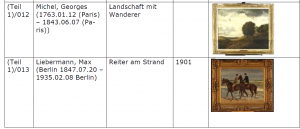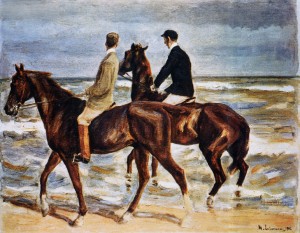After months of relative inactivity, there was news this week in the saga of Cornelius Gurlitt, the reclusive German man from whose apartments in Munich and Salzburg more than 1,280 objects were seized as part of a tax investigation, objects that came under suspicion of Nazi looting because of the privileged position held by his father Hildebrand Gurlitt. Unfortunately, the latest news continues a string of public relations efforts that bespeak no real progress as we approach the second anniversary of the public awareness of the story. Quite unlike the plaudits that were thrown around by many last year (though not by us) concerning Germany’s agreement with Gurlitt’s named heir, the reaction has been appropriately skeptical this time.
Gurlitt Collection May be Displayed Next Year, Real Progress Still Elusive as Focus Remains on Public Relations
Topics: cultural property, Sepp Dürr, Schwabinger Kunstfund, Hildebrand Gurlitt, Art Hall of the Federal Republic of Germany, Cornelius Gurlitt, Bonn Minister of Culture, Nazi-looted art, Gurlitt Collection, Entartete Kunst, Munich, World Jewish Congress, Salzburg, Restitution, Müncher Kunstfund, Der Spiegel, World War II, Task Force, Kunstmuseum Bern, Museums, Monika Grütters, Raubkunst, Green Party, Kunsthalle der Bundesrepublik Deutschland, Ronald Lauder
Gurlitt Bequest to Kunstmuseum Bern is Upheld, Little Else Resolved
A Munich court ruled last week that the will written by Cornelius Gurlitt in the last days of his life that named the Kunstmuseum Bern (an institution with which he had no relationship whatsoever) was valid, rejecting a challenge by Gurlitt’s cousin Uta Werner. It is emblematic of the strange case of Gurlitt and of German’s bizarre handling of the affair, that this decision resolves very few of the pending issues.
Topics: Conny Leaks, Focus, Carl Spitzweg, Hildebrand Gurlitt, Potemkin Village, Cornelius Gurlitt, Breslau, Henri Hinrichsen, German Minister of Culture, Uta Werner, Gurlitt Task Force, Max Liebermann, Germany, Nazi-looted art, Gurlitt Collection, Seated Woman, Two Riders on the Beach, Entartete Kunst, Salzburg, Gurlitt, NS Raubkunst, Seuddeutsche Zeitung, Restitution, Catrin Lorch, Bavaria, David Toren, World War II, degenerate art, beschlagnahmte Kunst, Austria, Kunstmuseum Bern, Monika Grütters, Martha Hinrichsen, David Friedmann, Henri Matisse, Jörg Häntzschel, Paul Rosenberg
Gurlitt Collection Information Finally On View, Provenance Details Still Needed
As the world adjusts to the announcement last week that the Kunstmuseum Bern has decided to accept Cornelius Gurlitt’s bequest (amid the continuing uncertainty about the validity of the will itself), the most significant development has been the museum’s posting of an inventory of the objects themselves. The museum issued a press release that states:
Topics: Swiss Info, Schwabinger Kunstfund, Hildebrand Gurlitt, Cornelius Gurlitt, Monopol, Nazi-looted art, Gurlitt Collection, Entartete Kunst, Restitution, Bavaria, Der Spiegel, Wall Street Journal, World War II, Degenerate Art Action, degenerate art, beschlagnahmte Kunst, Kunstmuseum Bern, Museums, Münchner Kunstfund
Kunstmuseum Bern Accepts Appointment as Cornelius Gurlitt's Heir, Agreement with Germany
As expected, the press conference today in Berlin held by the Kunstmuseum Bern along with German officials announced that the museum has decided to accept the appointment as Cornelius Gurlitt's heir. As we surmised, the decision was accompanied by an agreement concerning the Nazi-looting suspicions that have followed the one time collection of his father Hildebrand Gurlitt. Hildebrand was one of a select few art dealers authorized during the Nazi regime to sell what the authorities deemed "degenerate art" (see link above for more background).
Topics: Swiss Info, Schwabinger Kunstfund, Hildebrand Gurlitt, Cornelius Gurlitt, Monopol, Nazi-looted art, Gurlitt Collection, Entartete Kunst, Willbald Gurlitt, Restitution, Bavaria, Der Spiegel, Wall Street Journal, World War II, Degenerate Art Action, degenerate art, beschlagnahmte Kunst, Kunstmuseum Bern, Münchner Kunstfund
Gurlitt Relatives Formally Challenge Will that Named Kunstmuseum Bern as Heir
When we wrote yesterday that everything had been said before seeing how the press conference plays out on Monday at which the Kunstmuseum Bern and Germany will make an announcement, it was somewhat tongue in cheek. Today provides an example why: relatives of Cornelius Gurlitt, who would be his heirs at law in the absence of the will that named the Kunstmuseum Bern as his heir, formally announced a challenge to that will today in a Munich court.
Topics: Schwabinger Kunstfund, Hildebrand Gurlitt, Cornelius Gurlitt, Monopol, Uta Werner, Nazi-looted art, Gurlitt Collection, Dietrich Werner, Entartete Kunst, Munich, Willbald Gurlitt, Restitution, Bavaria, World War II, Degenerate Art Action, Helmut Hausner, degenerate art, beschlagnahmte Kunst, Kunstmuseum Bern, Museums, Münchner Kunstfund
Gurlitt and Kunstmuseum Bern Press Conference in Berlin Monday November 24, 2014
The federal government of Germany, the Bavarian Ministry of Culture, and the Kunstmuseum Bern announced today that they will hold a joint press conference on Monday November 24, 2014 concerning the bequest by Cornelius Gurlitt to the Swiss museum when he died. It seems hard to imagine that such an event would announce anything other than acceptance by the museum and perhaps some sort of side agreement with Germany and/or Bavaria.
Topics: Swiss Info, Schwabinger Kunstfund, Hildebrand Gurlitt, Cornelius Gurlitt, Monopol, Nazi-looted art, Gurlitt Collection, Entartete Kunst, Willbald Gurlitt, Restitution, Bavaria, Der Spiegel, Wall Street Journal, World War II, Degenerate Art Action, degenerate art, beschlagnahmte Kunst, Kunstmuseum Bern, Münchner Kunstfund
If the Kunstmuseum Bern Says No: Gurlitt Heirs Discuss Plans if They Inherit Schwabing Trove
As the November 26, 2014 deadline approaches by which the Kunstmuseum Bern must accept or reject the appointment as Cornelius Gurlitt’s heir and the bequest of the paintings seized by the Bavarian government on suspicions of Nazi-looting concerns (as well as those in other countries that were not seized), most observers expect the museum to accept the appointment, albeit perhaps with some side agreement with the German government. But what if the museum says no? Reports floated this week of what Gurlitt’s heirs-at-law might do in that event.
Topics: Schwabinger Kunstfund, Hildebrand Gurlitt, Cornelius Gurlitt, Monopol, SZ, Nazi-looted art, Gurlitt Collection, Entartete Kunst, Willbald Gurlitt, Restitution, Bavaria, World War II, Degenerate Art Action, degenerate art, beschlagnahmte Kunst, Kunstmuseum Bern, Münchner Kunstfund
Reports that Gurlitt Task Force May Not Meet Deadline—What Happens Then?
There were reports over the weekend that the Gurlitt Task Force, currently reviewing the provenance of more than 900 of the 1,280 works of art seized from Cornelius Gurlitt’s apartment, may not complete that review within the year reportedly set out in the agreement between Bavaria and Gurlitt before he died. There is still confusion about whether the Task Force was indeed foreshadowing a missed deadline (the agreement was in April, so the notion that the review would continue “into 2015” is not necessarily inconsistent with completing its task within one year), but assuming it was, what happens then?
Topics: Focus, Schwabinger Kunstfund, Hildebrand Gurlitt, Cornelius Gurlitt, Gurlitt Task Force, Nazi-looted art, Gurlitt Collection, Foreign Sovereign Immunities Act, Commission for Looted Art in Europe, Entartete Kunst, Anne Webber, Restitution, Der Spiegel, World War II, degenerate art, Kunstmuseum Bern, verschollene Kunst, Münchner Kunstfund
One Year After Gurlitt Revelation, No One is Pleased
It has now been one year since Focus magazine in Germany broke the Cornelius Gurlitt story on November 3, 2013. Looking back at the history of the case as it has unfolded since then, the overriding theme has been difficulty in obtaining accurate information about the current state of affairs. The appointed Task Force has made only two recommendations, and the status of the bequest to the Kunstmuseum Bern is still up in the air. And nobody seems remotely pleased.
Topics: Focus, Schwabinger Kunstfund, Hildebrand Gurlitt, Cornelius Gurlitt, Drefsden, Gurlitt Task Force, Nazi-looted art, Gurlitt Collection, Foreign Sovereign Immunities Act, Lex Gurlitt, Entartete Kunst, Salzburg, Bundesrat, Restitution, Der Spiegel, World War II, Foreign Sovereign Immunities, Switzerland, degenerate art, Kunstmuseum Bern, verschollene Kunst, Münchner Kunstfund, Ronald Lauder
Toren Amends Complaint Against Bavaria Over Liebermann Seized from Gurlitt, Spotlights Task Force Recommendation of Restitution in Support of Bailment Theory
Two weeks ago, the Federal Republic of Germany and Bavaria moved to dismiss the restitution claims brought by David Toren over ownership of Two Riders on the Beach (Zwei Ritter am Strand) by the German painter Max Liebermann. Toren’s uncle David Friedmann owned the painting in Breslau before he was targeted for his collection and it was stolen. Toren had not seen it since adolescence. The painting is further notable for two (related) reasons: it is among the 1,280 works of art found in Cornelius Gurlitt’s apartment in 2012, and it is one of only two that the Gurlitt Task Force has recommended be restituted (to Toren). As we noted at the time of the motion, Germany’s tactics seemed odd; Bavaria has committed to complying with the Task Force’s recommendations, and contesting this case seems to make little sense. The likeliest reason, in our view, is to try to make some jurisdictional law that will weaken other potential claimants to the Gurlitt trove.
Topics: Schwabinger Kunstfund, Hildebrand Gurlitt, Cornelius Gurlitt, Breslau, Max Liebermann, Germany, Silesia, Gurlitt Collection, Foreign Sovereign Immunities Act, bailment, Entartete Kunst, FSIA, Restitution, Bavaria, David Toren, Zwei Ritter am Strand, Free State of Bavaria, 28 U.S.C. § 1605(a)(2), Looted Art, World War II, Foreign Sovereign Immunities, Altmann v. Republic of Austria, Freistaat Bayern, Kunstmuseum Bern, Riders on the Beach, Federal Republic of Germany, Raubkunst, David Friedmann, Münchner Kunstfund




